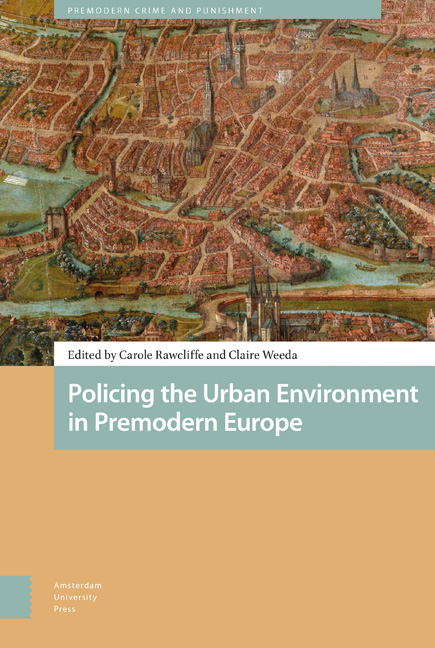Book contents
- Frontmatter
- Contents
- List of Illustrations
- List of Figures and Charts
- Introduction
- 1 Cleanliness, Civility, and the City in Medieval Ideals and Scripts
- 2 The View from the Streets: The Records of Hundred and Leet Courts as a Source for Sanitary Policing in Late Medieval English Towns
- 3 Urban Viarii and the Prosecution of Public Health Offenders in Late Medieval Italy
- 4 Food Offenders: Public Health and the Marketplace in the Late Medieval Low Countries
- 5 Policing the Environment of Late Medieval Dordrecht
- 6 Muddy Waters in Medieval Montpellier
- 7 Regulating Water Sources in the Towns and Cities of Late Medieval Normandy
- 8 Policing the Environment in Premodern Imperial Cities and Towns: A Preliminary Approach
- 9 Official Objectives of theVisitatio Leprosorum: Ambiguity, Ambivalence, and Variance
- Index
3 - Urban Viarii and the Prosecution of Public Health Offenders in Late Medieval Italy
Published online by Cambridge University Press: 21 November 2020
- Frontmatter
- Contents
- List of Illustrations
- List of Figures and Charts
- Introduction
- 1 Cleanliness, Civility, and the City in Medieval Ideals and Scripts
- 2 The View from the Streets: The Records of Hundred and Leet Courts as a Source for Sanitary Policing in Late Medieval English Towns
- 3 Urban Viarii and the Prosecution of Public Health Offenders in Late Medieval Italy
- 4 Food Offenders: Public Health and the Marketplace in the Late Medieval Low Countries
- 5 Policing the Environment of Late Medieval Dordrecht
- 6 Muddy Waters in Medieval Montpellier
- 7 Regulating Water Sources in the Towns and Cities of Late Medieval Normandy
- 8 Policing the Environment in Premodern Imperial Cities and Towns: A Preliminary Approach
- 9 Official Objectives of theVisitatio Leprosorum: Ambiguity, Ambivalence, and Variance
- Index
Summary
Abstract
Roads officials (viarii) were integral to many Italian cities’ strategies for combatting disease and promoting health. Yet their significance for the history of environmental policing remains largely unrecognised. This chapter begins by mapping the contours of the office in the peninsula’s centre and north between the thirteenth and fifteenth centuries. It then explores the activities of viarii in that period and region through recourse to the records of Lucca and Bologna. An examination of the Bolognese archival series throws new light on the resources that urban regimes dedicated to communal wellbeing, as well as the strategies required to implement their policies. These records offer a ‘bottom-up’ perspective on environmental health and the tensions underlying the exercise of premodern bio-power.
Key words: Italian city-states; Bologna; Lucca; public health; environment; fango; roads masters
In their quest to define and safeguard urban order, regimes across later medieval Italy staked claims on sites that were either understood or promoted as impacting upon communal health and welfare. Magistrates accordingly endowed infrastructures such as streets, sewers, fountains, and walls with life-preserving and life-threatening qualities, and denunciations and litigation concerning their misuse regularly invoked the protection, not only of a general public good (bonum communis), but also of local populations’ health (sanitas hominum). Central, if hardly exclusive, agents bringing offenders to justice in this context were small outfits of ‘works’ or ‘roads’ officials, often known as viarii. In some cases, their remit came to include the maintenance and supervision of urban infrastructures and the right to fine people who appeared to undermine them by creating safety hazards and spreading pollution. To be sure, these efforts were only one aspect of an evolving and multi-pronged approach to urban healthscaping. Yet, while the hiring of communal physicians, the foundation of leprosaria and hospitals, and the implementation of emergency anti-plague measures have won the lion's share of scholarly attention, the somewhat pedestrian routines of Italian viarii provide fresh insights into premodern approaches to public health. From this volume's perspective, moreover, viarii's actions certainly included prosecutions and above all summary judicial procedures, whose role and function in the context of urban policing on the one hand and population-level prophylactic interventions on the other remain understudied.
- Type
- Chapter
- Information
- Policing the Urban Environment in Premodern Europe , pp. 97 - 120Publisher: Amsterdam University PressPrint publication year: 2019



